PALO ALTO, Calif. (Reuters) - The Federal Reserve is looking at a broad variety of concerns around digital payments and currencies, consisting of policy, style and legal factors to consider around possibly issuing its own digital currency, Guv Lael Brainard said on Wednesday. Brainard's remarks recommend more openness to the possibility of a Fed-issued digital coin than in the past." By changing payments, digitalization has the prospective to deliver higher worth and benefit at lower expense," Brainard stated at a conference on payments at the Stanford Graduate School of Business.
Central banks internationally are discussing how to handle digital finance innovation and the dispersed ledger systems utilized by bitcoin, View website which guarantees near-instantaneous payment at possibly low expense. The Fed is developing its own day-and-night real-time payments and settlement service and is currently reviewing 200 remark letters submitted late in 2015 about the proposed service's design and scope, Brainard stated.
Less than 2 years ago Brainard informed a conference in San Francisco that there is "no engaging demonstrated need" for such a coin. But that was before the scope of Facebook's digital currency aspirations were extensively known. Fed authorities, consisting of Brainard, have raised issues about customer protections and information and privacy hazards that might be posed by a currency that might enter use by the third of the world's population that have Facebook accounts.

" We are working together with other reserve banks as we advance our understanding of Informative post central bank digital currencies," she said. With how to buy fedcoin more nations checking out issuing their own digital currencies, Brainard said, that contributes to "a fed coin 2020 set of factors to likewise be ensuring that we are that frontier of both research and policy advancement." In the United States, Brainard stated, issues that need study include whether a digital currency would make the payments system much safer or easier, and whether it could present monetary stability dangers, including the possibility of bank runs if cash can be turned "with a single swipe" into the main bank's digital currency.
To counter the monetary damage from America's extraordinary nationwide lockdown, the Federal Reserve has actually taken unmatched actions, consisting of flooding the economy with dollars and investing directly in the economy. The majority of these moves got grudging approval even from many Fed doubters, as they saw this stimulus as needed and something only the Fed might do.
My new CEI report, "Government-Run Payment Systems Are Unsafe at Any Speed: The Case Against Fedcoin and FedNow," information the dangers of the Fed's existing prepare for its FedNow real-time payment system, and propositions for main bank-issued cryptocurrency that have actually been dubbed Fedcoin or the "digital dollar." In my report, I talk about concerns about privacy, information security, currency adjustment, and crowding out private-sector competition and development.
Supporters of FedNow and Fedcoin state the federal government must create a system for payments to deposit instantly, rather than encourage such systems Homepage in the personal sector by lifting regulatory barriers. But as noted in the paper, the personal sector is supplying an apparently endless supply of payment technologies and digital currencies to fix the problemto the extent it is a problemof the time space between when a payment is sent and when it is received in a savings account.
And the examples of private-sector development in this area are numerous. The Clearing House, a bank-held cooperative that has been routing interbank payments in numerous kinds for more than 150 years, has actually been clearing real-time payments because 2017. By the end of 2018 it was covering 50 percent of the deposit base in the U.S.